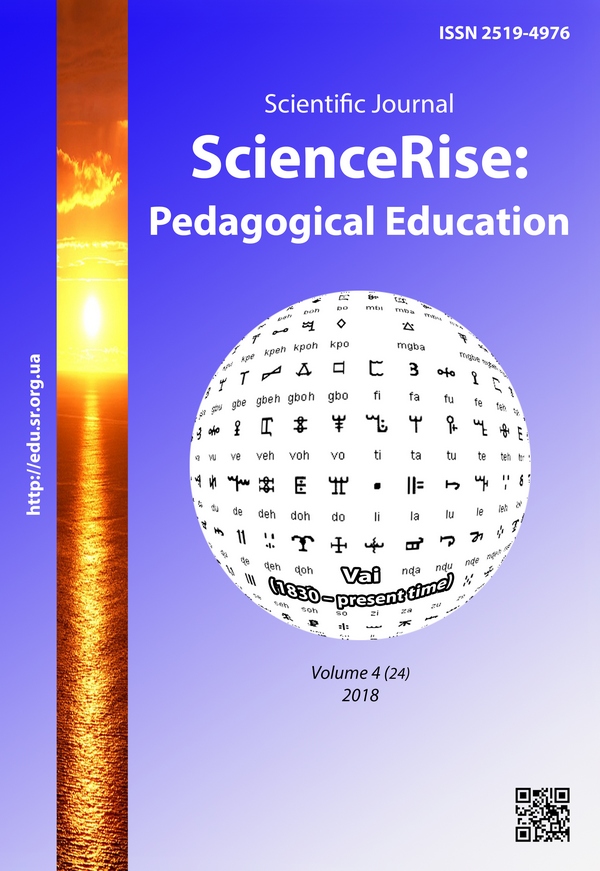Formation and development stages of gender education in a higher school of the post-soviet countries
DOI:
https://doi.org/10.15587/2519-4984.2018.132524Keywords:
gender education, gender studies, discourse, periodization, higher school, post-Soviet countriesAbstract
The article deals with the history of the emergence and evolution of gender education in a higher school of the post-Soviet countries. The scholars’ approaches to the classification of periods of gender education development in the post-Soviet area are analyzed. The general boundaries of the evolution of gender education in the post-Soviet higher school, which is almost thirty years old (beginning of the 1990s – to the present day), have been established. There are three decades of gender education development in a higher school of the post-Soviet area and each decade coincides with a certain stage and is determined by the solution of specific tasks: the first decade (1991–2000) – the stage of gender education formation and institutionalization in the system of higher education, which is characterized by the creation of organizational structures for gender studies at universities; the second decade (2001–2010) is a period of stimulation of gender initiatives in the science and education of the post-Soviet countries, when the legitimacy of gender issues in the academic environment takes place and gender paradigm formation in education is carried out; the third decade (2011 – and to this day) – the stage of integrating gender education into the post-Soviet higher education system, which has not become systematic and mostly occurs in spontaneously inertial mode. The general tendency is found out. It is about the likelines of features of gender education formation in a higher school of the post-Soviet countries and uneven dynamic of its development
References
- Savinskaya, O. B., Kochkina, E. V., Fedorova, L. N. (Eds.) (2004). Gendernaya integratsiya: Vozmozhnosti i predely sotsial'nykh innovatsiy. Saint Petersburg: Aleteyya, 298.
- Doronina, T. O. (2012). Teoriia i praktyka hendernoi osvity i vykhovannia uchnivskoi molodi v navchalnykh zakladakh Ukrainy (II polovyna XX – pochatok XIX stolittia). Zaporizhzhia, 524.
- Shustova, L. P. (2010). Gendernoe obrazovanie pedagogicheskikh kadrov // Uchenye zapiski Pedagogicheskogo instituta SGU im. N. G. Chernyshevskogo. Seriya: Psikhologiya. Pedagogika, 1, 95–99.
- Shtyleva, L. V. (2008). Faktor pola v obrazovanii: gendernyy podkhod i analiz. Moscow: PER SE, 316.
- Petrenko, O. B. (2010). Hendernyi vymir shkilnoi osvity v Ukraini (XX stolittia). Rivne, 530.
- Gendernoe obrazovanie (regional'nyi obzor v vos'mi stranakh SNG: Armenii, Azerbaydzhane, Gruzii, Kazakhstane, Kyrgyzstane, Moldove, Tadzhikistane i Uzbekistane) (2006). Moscow: OOO «Variant» – IGSP, 320.
- Matiushkova, S. D. (2012). Vozniknovenie i razvitie obrazovaniia v kontekste gendernoy kul'tury v Respublike Belarus'. Vesnik Vicebskaga dzjarzhawnaga wniversitjeta, 1 (67), 81–85.
- Shhurko, T. (2013). Gendernoe vospitanie: osobennosti institutsializatsii v Belarusi. «Nashe Mnenie» Sayt ekspertnogo soobshhestva Belarusi. Available at: http://nmnby.eu/news/analytics/5175.html
- Shchurko, T. (2011). Dyskursi pola y hendera v systeme postsovetskoho sredneho obrazovanyia (case v Belarusy). Genderna osvita – resurs rozvytku parytetnoi demokratii). Kyiv, 76–79.
- Bodrug-Lungu, V.; Grünberg, L. (Ed.) (2011). Gendering Higher Education Curricula at Moldova State University. From Gender Studies to Gender IN Studies. Case Studies on Gender-Inclusive Curriculum in Higher Education. Bucharest, 73–102.
- Aghayeva, K. (2012). Women, Men and Education in Azerbaijan. Khazar Journal of Humanities and Social Sciences, 15 (3), 26–41. doi: 10.5782/2223-2621.2012.15.3.26
- Gureyeva, Y. (2005). National Status Report on Higher School Reforms and Gender Education in the Country. Baku, 21.
- Babayan, S., Budagyan, A., Melkumyan, Yu. (2006). Otchet o sostoyanii reform v sisteme vysshego obrazovaniya i o sostoyanii gendernogo obrazovaniya v Armenii. Gendernoe obrazovanie (regional'nyi obzor v vos'mi stranakh SNG: Armenii, Azerbaydzhane, Gruzii, Kazakhstane, Kyrgyzstane, Moldove, Tadzhikistane i Uzbekistane). Moscow: OOO «Variant»–IGSP, 55–98.
- Osipov, V. (2016). Institutionalization of Gender Studies in Armenia: Drivers and Constraints. Cultural Context of the Institutionalization of Gender Studies in XXI century. Yerevan, 4–15. Available at: http://www.ysu.am/files/_ՀՈԴՎԱԾՆԵՐ_2016_ԳՀԱԿ.pdf
- Khasbulatova, O. A. (2001). Gendernym issledovaniyam v sisteme vysshego obrazovaniya Rossii – 10 let. Zhenshhina v rosssiyskom obshhestve, 1, 2–14.
- Khotkina, Z. A. (2000). Gendernym issledovaniyam v Rossii – desyat' let. Obshhestvennye nauki i sovremennost', 4, 21–26.
- Kis, O. (2009). Ukraini potribna henderna ekspertna platforma. Krona, 2, 5–14.
- Smoliar, L. O. (2003). Prohres ta perspektyvy zhinochykh i hendernykh doslidzhen v Ukraini. Problemy osvity, 36, 9–41.
- Fofanova, K. V. (2004). Stsenarii razvitiya gendernogo obrazovaniya v vysshey shkole. Integratsiya obrazovaniya, 3, 43–49.
- Kozlova, N. N. (2013). Suverennyy «gender» ili gendernye issledovaniya v Rossii. Sotsial'no-politichekie protsessy v menyayushhemsya mire. Tver': Izdatel'stvo Tverskoy gos. un-t., 3–18.
- Kochkina, E. (2017). Gendernye issledovaniya v Rossii: genezis, dostizheniya i perspektivy 28 let spustya. Navstrechu budushhemu. Prognozirovanie v sotsiologicheskikh issledovaniyakh. Moscow. Available at: http://socialchange.ru/documents/3245
- Volina, L. G. (2013). Kompleksnyy analiz gendernoy problematiki v Respublike Belarus'. Minsk, 2, 391–395. Available at: http://elib.bsu.by/bitstream/123456789/96365/1/391-395.pdf
Downloads
Published
How to Cite
Issue
Section
License
Copyright (c) 2018 Svitlana Hryshak

This work is licensed under a Creative Commons Attribution 4.0 International License.
Our journal abides by the Creative Commons CC BY copyright rights and permissions for open access journals.
Authors, who are published in this journal, agree to the following conditions:
1. The authors reserve the right to authorship of the work and pass the first publication right of this work to the journal under the terms of a Creative Commons CC BY, which allows others to freely distribute the published research with the obligatory reference to the authors of the original work and the first publication of the work in this journal.
2. The authors have the right to conclude separate supplement agreements that relate to non-exclusive work distribution in the form in which it has been published by the journal (for example, to upload the work to the online storage of the journal or publish it as part of a monograph), provided that the reference to the first publication of the work in this journal is included.







